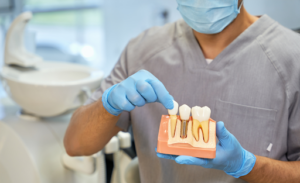More people than ever before are choosing dental implants to enhance and restore their smile. After all, if you are unhappy with your teeth, this can have a huge impact on other areas of your life – particularly your self-esteem and confidence.
As a great treatment for replacing a missing tooth or teeth, this restorative form of dentistry is incredibly popular and can be life-changing.
But are dental implants painful? In this blog, we outline everything that you need to know about the dental implant procedure, so that you can decide whether or not this restorative treatment is the perfect option for you.
What are dental implants?
If you are considering opting for dental implants, it is important that you fully understand what it is and how it works.
As the best solution to replace missing or loose teeth, or fix gaps in teeth, a dental implant procedure involves strategically placing a medical-grade screw directly into the jawbone to replace the missing tooth root.
A dental crown is then secured onto the screw and matched to the colour and shape of your existing teeth – enhancing your natural teeth both aesthetically and functionally.
How are dental implants suitable for you?
There are a number of different reasons why a dental implant may be the most suitable treatment to restore the look and feel of your teeth.
It is likely to be a recommended treatment if:
- Your tooth/teeth cannot be saved in any other way
- You find it difficult to use dentures
- You have significant damage to your teeth
- You are not able to chew, speak, or laugh properly due to dental issues
- You are looking to enhance your natural smile aesthetically
- You require implants due to gaps or chips created by impact, trauma, or any other accident
Of course, our dentists are more than happy to provide more tailored advice on whether or not dental implants are a suitable solution for your oral health needs.
Are dental implants painful?
Naturally, many patients who are considering dental implants ask the question: Are dental implants painful?
At Beaulieu Dental, our team is dedicated to providing patients with a comfortable and stress-free experience. To ensure comfort during the procedure, our dentists offer anaesthesia so that your mouth is numbed to lessen any feeling of pain. While you may still feel pressure at times, this should not cause you any discomfort.
While the dental implant procedure can cause a little discomfort during the healing process, there are plenty of over-the-counter medications our dentists can recommend that can be used to manage any pain effectively.
What you can expect during the dental implant procedure

If you are wondering what to expect during the dental implant procedure, here is our step-by-step guide outlining each stage.
Step 1: Treatment Planning
Our dentists will first schedule a dental implant consultation appointment, where your oral health will be assessed with an examination, and possibly X-rays or CBCT scan. Then, they will look at your medical history, and discuss your dental concerns and treatment goals, to determine if dental implants are a suitable solution for you.
You will also have the opportunity to ask any questions you have about the treatment and procedure.
Step 2: Preparation
Following the assessment, a personalised treatment plan will be created to give you a breakdown of what exactly will happen before, during, and after the procedure. This will include a cost breakdown, the number of implants needed, and your bone density.
While some other dental treatments require teeth preparation before the procedure, dental implants typically do not require this.
If you lack sufficient bone for the treatment, an additional procedure for a bone graft may be necessary before the dental treatment can begin. Your implantologist will discuss your options with you and address your preferences.
Step 3: Procedure
Before the procedure begins, local anaesthesia will be used to numb your mouth.
While a straightforward treatment, if you do feel nervous about the procedure then discuss this with your dentist as sedation may be offered to help put your anxiety at ease.
Once the tooth area is completely numb, the procedure will begin. Your dentist will cut into your gum and drill a small hole into the jawbone to create a space for the medical-grade screw. This is then inserted into the space and once secured, the temporary cap is placed on top to keep the implant safe and secure during the healing process.
Step 4: Aftercare and Fitting
Our dentists recommend a healing period of approximately three months, to allow time for the bone to fuse with the implant. Once fused, your dental crown can be created and attached on top to restore your natural smile.
After the treatment, you may experience some soreness or discomfort for a few days, gradually returning to normal within the first week, but your dentist will provide any aftercare advice.
How long is the dental implant recovery process?
The vast majority of our patients are pleasantly surprised at how seamless dental implant surgery can be, especially when it comes to enjoying the results of the surgery within a matter of days!
Almost all dental implant patients can return to work or take part in their usual day-to-day activities pretty much straight away. However, post-surgery, our dentists advise how important it is to look after your implants and follow their aftercare advice.
Aftercare: What you should do
- You should only eat soft foods for at least one week following surgery
- You should only take over-the-counter pain relief, such as paracetamol or ibuprofen to manage any pain
- You should keep your mouth as clean as possible by adopting the best oral hygiene practices
- You should rinse your mouth with recommended mouthwash at least three or four times a day
- You should take any antibiotics you have been prescribed
Aftercare: What you shouldn’t do
- You should avoid eating hot food and drinks in the first 24 hours after surgery
- You should not participate in any form of strenuous activity in the first 24 hours
- You should not use an e-cigarette
- You should not drink alcohol or smoke for at least two weeks
- You should not wear any dentures that cover the affected area
Why you should choose Beaulieu Dental
Beaulieu Dental is a modern and welcoming dental practice in Chelmsford, and our team is incredibly proud of our 5-star rating on both Google and Facebook.
Our expert dental team appreciates the importance of your oral health – understanding how much you value your smile.
At our practice, we offer a wide range of treatments, and we are currently accepting new private and Denplan patients. We welcome referrals from other dental practices for treatments such as CT scans, OPG X-rays, and Implant and Cosmetic treatments.
We also offer 24-hour, 7-day-a-week emergency appointments, as well as direct access appointments with our hygienist, so you can book without first seeing a dentist.
Get in touch with our friendly team and take the first step to restoring your smile today!


